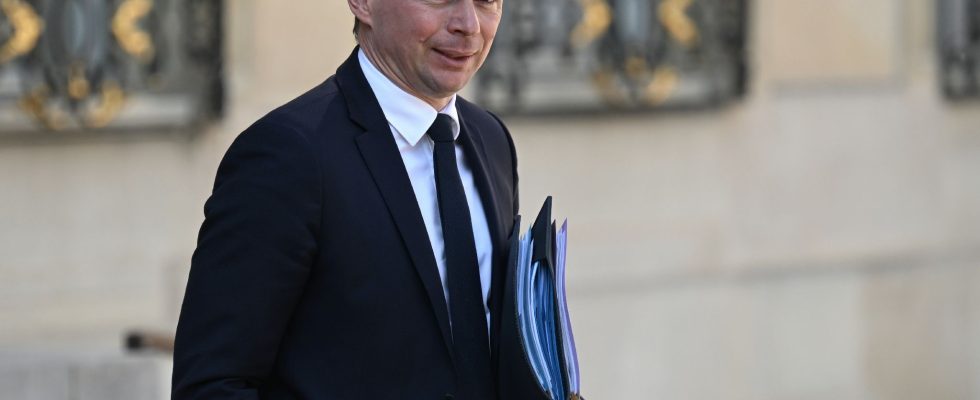A new battle is opening between the government and the social partners. After five weeks of intense negotiations, the unions and employers managing the supplementary pension plan for private sector employees Agirc-Arrco reached an agreement during the night from Wednesday to Thursday.
Barely made public, it provoked the ire of the Minister of Labor Olivier Dussopt. He criticized them on Thursday for “new spending”, which “jeopardizes the balance of the pension reform” and the “credibility of public finances”. Story of a week of tensions.
The extra-full boxes of Agirc-Arrco
It is a fact, unlike that of the State, the complementary coffers of private sector employees are full. This year, Agirc-Arrco’s surpluses amount to four billion euros and reserves to more than 68 billion euros. Reserves that the government has coveted for a long time. Already at the end of 2022, during the consultation with the unions and employers on the pension reform, the executive had warned that it intended to request the joint regime to finance the revaluation of small pensions, which was finally implemented in the reform promulgated in mid-April.
But since then, the government’s quest has changed slightly, even grossly. It now requires action to help balance our pay-as-you-go system. A contribution oscillating between 1 and 3 billion euros per year, ultimately, according to initial estimates from the Ministry of Labor. Guest, Tuesday morning,Europe 1the Minister of Labor put pressure again, ensuring that Agirc-Arrco will be made a “contribution” to participate in the “general balance” of our entire pension system.
To justify his position and maintain the standoff, Olivier Dussopt argued that Agirc-Arrco will also benefit from the postponement of the legal age of departure to 64 years. And thanks to this parametric adjustment, the private supplementary pension fund, already in surplus of 5.1 billion in 2022, will see its situation improve, from “1 to 1.2 billion euros” in 2026, according to the minister’s calculations.
Standoff between Dussopt and the social partners
However, the social partners reject this idea outright, especially in the face of incessant pressure from the government. “This poses three big problems for us,” confided Patrick Martin, the president of Medef to World this week. First, he argues, the “room for maneuver” of the system’s managers would be reduced “to deal with other subjects” (revaluation of pensions, accumulation of retirement employment, etc.). In addition, “confusion” would be introduced “between the equal and public spheres, presenting a major risk of denaturing the regime in the long term”. Finally, “any prospect of a reduction in contributions would be hampered in the future”. In the same article, the confederal secretary of FO, Michel Beaugas, was indignant at a “misappropriation of funds” committed by the power in place.
On Tuesday, Olivier Dussopt went as far as making threats. If the social partners do not go in the government’s direction: “There is a social security finance bill which could allow us to move forward on the subject…”. In other words, the minister could ask to drain Agirc-Arrco, to pay, for example, the 14 billion euros cost of the 5.2% pension increases announced on Wednesday by Bruno Le Maire.
Revaluations for the private sector, but no solidarity with the public
The final round of negotiations between the employers and the Agirc-Arrco unions therefore took place on Wednesday from 3 p.m. and until late at night, under pressure from the government. Managed by social partners, the supplement pays more than 87 billion euros to 13 million retirees each year. This additional part represents between 20% of the total pension for precarious employees and 60% for certain executives.
Taking advantage of the plan’s surpluses, they notably decided to increase supplementary pensions by 4.9% on November 1 – in line with inflation – and to remove the 10% “penalty” which encouraged employees to postpone their departure from ‘a year. They also introduced, based on the model of the general system, the possibility for retirees who combine employment and retirement to slightly improve their pensions.
They also stood up on one point: their total refusal to organize a “financial pipeline” to the State, which was asking them for between 1 and 3 billion euros annually by 2030 to help finance the increase in small pensions. provided for by the pension reform, and the “return to balance” of the overall pension system. “In their agreement, the social partners decided on new spending, financed by the yield from the pension reform and did not define a solidarity mechanism to protect this yield. This decision jeopardizes the balance of the reform and the credibility of our public finances”, said Olivier Dussopt after the announcement of the agreement.
